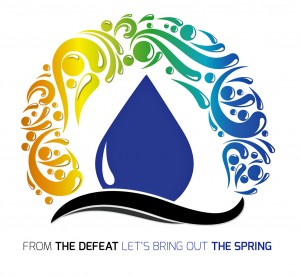Logo inspired in the poem “Por qué cantamos” (Why we sing), by Mario Benedetti
WATERLAT-GOBACIT VII International Meeting
Water politics and social change.
What lessons can we learn from the new defeats of “development”?
Campus ITESO, The Jesuit University of Guadalajara, Jalisco, Mexico, 19-23 October 2015
Programme (in Spanish)
Brief evaluation of the meeting by the coordinators (in Spanish)
Welcome by Dr José Morales Orozco, ITESO’s Rector, to the participants of the WATERLAT-GOBACIT VII International Meeting (in Spanish)
Preparatory events (in Spanish)
The theme chosen is an invitation to debate the interrelations between the politics of water, in their different forms and dimensions, and long-term processes of social change, with emphasis on forward-looking, progressive social change. 2015 is a very timely year to engage in this debate, taking into account, among other things, the need to make a balance of the Millennium Development Goals (MDGs) that the international community set in the year 2000 and that were to be met this year. There is a close relationship between several MDGs and water issues, most particularly in the case of MDG 7, that addressed the environmental dimension and included the targets of reducing by half the proportion of the world population without access to safe drinking water and basic sanitation. As monitoring reports had warned over the last decade, we were far from meeting the MDG for sanitation and, although official discourses claim that we would have met the target for safe drinking water, the evidence emerging from research casts serious doubts about the validity of such claims. We must also remember that even if we had met the MDGs for water and sanitation in 2015, half of the unserved world population would still lack access to these basic services, essential for human survival and dignified life. Not something to make us feel proud about, as it raises uncomfortable questions not just about the meaning of “development” and “progress”, a much debated topic in the last few decades, but also about the possibility of democracy as a universal, egalitarian societal project. In this sense, we can responsibly say that the failure to meet the MDGs is another, perhaps the most recent, defeat of “development” which has been inflicted on a substantial section of the human species. We propose to discuss in our meeting what lessons we can, and should, learn from the defeat, with the objective of developing alternatives, strategies and interventions oriented to foster and consolidate new social transformations to enhance our chances of success in confronting the inhuman character of the dominant social system.
The meeting was jointly organized by the WATERLAT-GOBACIT Network and ITESO.
Views of Guadalajara and Jalisco:
The meeting is organized with the support of (in alphabetical order):
Casa CEM – Culture, Education, Environment, Guadalajara, Jalisco, Mexico.
Centre for Research and Higher Studies in Social Anthropology (CIESAS – West), Guadalajara, Jalisco, Mexico.

El Colegio de Jalisco, Guadalajara, Jalisco, Mexico.
El Colegio de Michoacán, Zamora, Michoacan, Mexico.
![]()
El Colegio de San Luis (COLSAN), San Luis Potosi, Mexico.
![]()
Latin American Faculty of Social Sciences (FLACSO), Mexico City.

Media for Change, Palmetto Bay, Florida, United States.
![]()
Mexican Institute for Community Development (IMDEC), Jalisco, Mexico.
![]()
National Autonomous University of Mexico, Regional Studies Academic Unit, Jiquilpan, Michoacan, Mexico.


Newcastle University, Newcastle upon Tyne, United Kingdom.

Public Services International (PSI), Inter-American Coordination for Water, Sanitation, and Environment, San Jose, Costa Rica.

Secretariat of Environment and Territorial Development (SEMADET), Government of the State of Jalisco, Guadalajara, Jalisco, Mexico.


University of Guadalajara, Centre of Social Sciences and Humanities (CUCSH), Guadalajara, Jalisco, Mexico.

University of Guadalajara, La Cienaga University Centre (CUCI), Ocotlan, Jalisco, Mexico.

University of Guanajuato, Campus Leon, Leon, Guanajuato, Mexico.
![]()
Water Network, Mexican Academy of Sciences (AMC), Mexico City, Mexico.

Special sponsorship:
Check regularly this space for updated information about the meeting. You can also contact our Secretary to request information.




















